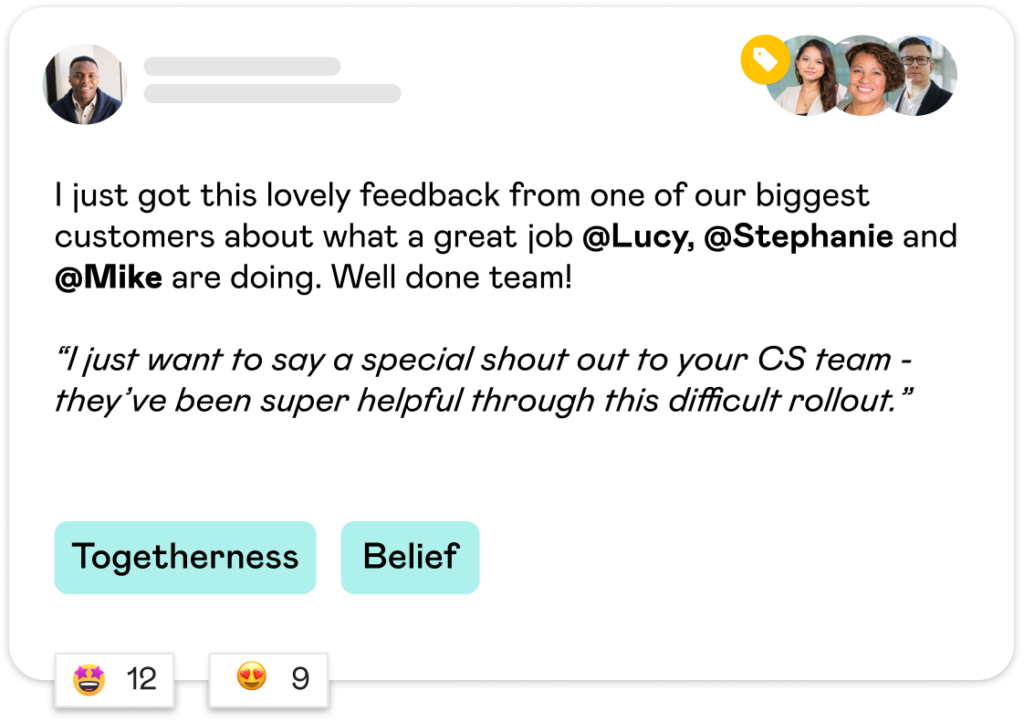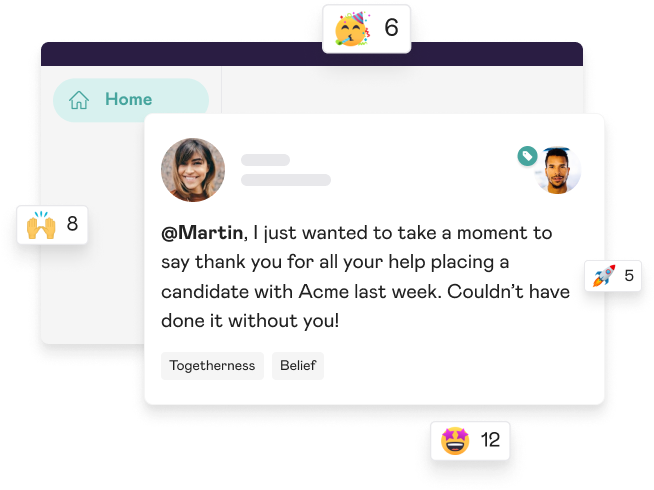A happy employee is a more productive employee, and we can all agree on that. There’s no denying that how employees feel about their work can truly impact a business, with those who are happy at work being significantly more productive, more engaged, and less likely to jump ship. But we also know that only a third of UK employees are happy in their jobs.
So how do you keep employees happy? Bonuses? More holiday leave? Flexible hours?
While all these options certainly would be well-received, sometimes the best answer is the one often overlooked: recognition. 69% of employees say they’d work harder if they were better appreciated by management.
We all know someone who has expressed how frustrated they are with not feeling seen, heard or rewarded at work (maybe even some of your employees are feeling this right now). Sadly, the most obvious solution to feeling under-appreciated at work is for the employee to find a new job. But this doesn’t have to be the case.
If you’re ready to tackle the problem, social recognition is one of the best cost-effective solutions for keeping your employee morale and engagement high. Getting the most out of this effort isn’t going to be easy. Forget those years of service rewards and think about recognising in the moment. Let’s talk about what social recognition is and why it is so important.
What is social recognition?
Everyone wants recognition for the hard work they’re doing. But, in a workplace setting, that often comes down to financial bonuses or incentives.
Social recognition is all about acknowledging someone in a way that doesn’t have any monetary value attached. While it seems straightforward, many companies fall flat when following through with social recognition.
It can be a simple “thank you” when passing an employee’s desk, a shoutout over Slack, or a quick moment of recognition during a staff meeting!

When employees know their hard work has been recognised, even with a passing acknowledgement, they feel valued for their contributions to your organisation and will strive to keep up that level of performance.
Social recognition is even more important for remote employees. For someone who works from home, it’s easy to feel disconnected and under-appreciated. A simple thank you can go a long way to making someone feel included and valued.
The importance of social recognition
Introducing a culture of social recognition into the workplace isn’t just about making your employees feel good – it can have lasting impacts on a business. Let’s take a look at the benefits of social recognition.
Increased employee engagement
It’s no secret that there is a powerful connection between employee recognition and engagement, and lack of recognition is one of the main reasons why employees are disengaged. Employee engagement is vital if you want to increase productivity, innovation and retention, and social recognition will help you amplify that recognition message.
Did you know that 92% of workers are more likely to repeat a specific action after receiving recognition for it? It shows that social recognition reinforces good work habits.
It’s beneficial for the brand, too. Strong engagement directly impacts business – a Forbes report found that teams who score in the top 20% in engagement have a 41% reduction in absenteeism and 59% less turnover.
This brings us to our next point…
Lower turnover of staff
According to Gallup, the number one reason most people leave their jobs is a lack of recognition.
It’s pretty simple. If you like your job and feel rewarded fairly for doing it, you will stick around. As a business, it’s essential to ensure your staff know just how valued they are. Lack of recognition and engagement contributes to 44% of employee turnover.
Higher productivity
It’s a flow-on effect. More recognition in the workplace leads to happier and more engaged employees, which ultimately leads to more productive workers.
Employees who regularly receive recognition for their work consistently display increased productivity.
Improved employee satisfaction
The end goal of social recognition is improved employee satisfaction. It is essential to have a team that is happy with their work, the company, and their co-workers. Without that, you simply can’t get ahead as a business. Employee recognition is the not-so-secret secret to improved employee satisfaction.
Decreased absence of staff
Not to keep repeating ourselves, but recognition makes staff happier. It boosts employee satisfaction by validating their daily life. When employees enjoy coming to work, managers see them taking fewer sick days and long lunches. A Gallup study of over two million workers found that businesses with engaged teams saw 81% less absenteeism.
The bottom line? Social recognition should be a top priority for your workplace.
How to practice social recognition
You’ve seen the benefits. Now it’s time to put it into practice.
Provide it frequently
Put your people at the heart of your business.
Social recognition isn’t just a one-and-done practice — to be effective, you must perform it regularly and on an ongoing basis.
Ongoing social recognition makes workers feel valued as team members rather than receiving once-off praise, which can sometimes fall flat.
Encourage peer-to-peer recognition
Receiving praise from a manager is important to employees for many reasons. It sets the foundation for their experience at the company, fostering a sense of mentorship. But peer-to-peer recognition goes one step further. By creating a positive work culture, your team will thrive even if you take your eye off the ball. Mo’s employee recognition software can be automised to give managers breathing space, encouraging employees to support each other through Moments and rewards.
Provide it in real-time
Don’t wait. If an employee does a stellar job or goes above and beyond, they should be recognised for it instantly. As we shared above, over 90% of employees say that when they’re recognised for a specific action, they’re more likely to do it again in the future.
Strike while the iron is hot, and encourage your team to strive to do their best constantly.
Encourage leaders to be better
Leaders are the ones who make a company. For a company to thrive, you need disruptive leadership. Leaders need to be constantly looking for better solutions, and ways to establish new processes and make an impact on the business as a whole.
Invest in employee recognition software
Implementing effective recognition practices in the workplace can be a huge undertaking, especially for large companies. Where do you even start?
Transform your culture with Mo

- Improve employee engagement scores
- Reduce employee churn
- Build a collaborative culture
Mo is an employee recognition and engagement platform that can help leaders improve collaboration and morale, reduce employee churn and drive change.
Our platform creates a vibrant culture by developing team habits, encouraging people to celebrate success, recognise results and appreciate colleagues. Your complete toolkit for connecting and motivating teams in the new world of work. Book a demo with our team today.




